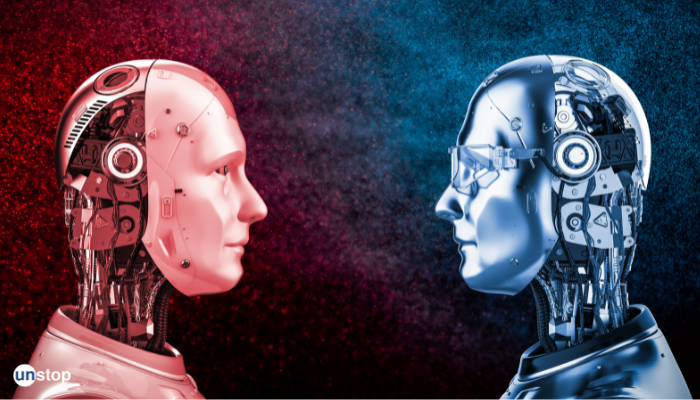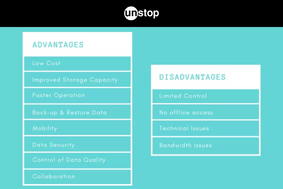- Hot topics: Data science and artificial intelligence
- What is data science?
- What is artificial intelligence?
- Data science vs artificial intelligence
- Duties and roles involved in data science and AI jobs
- Salary of data scientists and artificial intelligence engineers
- Which option is preferable in terms of a career?
- Conclusion
7 Differences Between Data Science And Artificial Intelligence

The ever-increasing significance of data in each and every industry has led to the rise of several new buzzwords, including "data science," "artificial intelligence," and "machine learning." People frequently get them mixed up and use them interchangeably, which is an incorrect practice. Although these concepts are related to one another, they cannot be synonymously used.
Also, there are some overlapping uses, but each of these terms has a distinct unique usage when it comes to enterprises. In this blog, we will list the difference between data science and artificial intelligence, together with the applications of each one of them.
Hot topics: Data science and artificial intelligence
According to IDC's projections, total global investment in artificial intelligence (AI) technology will reach USD 97.9 billion by the end of 2023. According to the research titled "LinkedIn's 2020 Emerging Jobs," artificial intelligence engineers and data scientists continue to put together a strong show as the top emerging employment titles over the past four years.
Statistics suggest an increase in the use of AI solutions is driving up demand for the skills that are necessary to make them a success. The fields of data science and artificial intelligence are really the rocket ships that are propelling us forward into the post-pandemic time with handsome paychecks and satisfying perks. It is not a secret that data scientists and artificial intelligence engineers are currently being crowned as the world's fastest-growing as well as dynamic job roles. These roles are essential to the development of bigger intelligence software products.
The professions of data scientists and artificial intelligence engineers are two separate but related ones. Though there's a difference between the roles and responsibilities of a data scientist and that of an artificial intelligence engineer, there is a significant degree of overlap between their skill sets. Data scientists are generally mathematically strong and conversant in programming skills. They rely on artificial intelligence engineers with a high level of expertise to incorporate their models and implement them into production environments.
What is data science?
Businesses use data science to derive statistical insights from accumulated data. The field of data science utilizes both structured and unstructured forms of data. It includes everything that has to do with data, such as selecting, preparing, and analyzing data.
It uses a variety of approaches involving statistics, mathematics, and programming in order to obtain meaningful patterns and insights from vast volumes of raw data that really are relevant to organizations.
Notably, data science is by far the most popular approach among all modern methods of utilizing data. In the modern world, data has become a source of money because an increased amount of data can assist an organization in delivering more business insights. Utilizing data science and machine learning (ML), businesses are developing recommendation engines that can anticipate the actions of users. When applied to the huge amount of data that is readily available, numerous search algorithms enable the production of accurate results. The more amount of information is collected, the more precise outcomes may be obtained by businesses.
Purpose of data science
Finding patterns in data is the primary objective of the field of data science. Utilizing a wide variety of statistical techniques to conduct analysis and obtain new insights and patterns is required. Both the current and historical data are utilized in the process of doing the predictive analysis of future results. These insightful forecasts and projections offer a window of opportunity for businesses to flourish and adjust their operations in response to changing market conditions.
Data science skills
- Programming languages: R, Python, SQL, MATLAB, and STATA
- Data wrangling: Cleaning, manipulating, and exploring data
- Data visualization: Creating graphs and charts
- Analyzing the data with statistical examinations of datasets
What is artificial intelligence?
The term "artificial intelligence" or simply AI refers to the capacity of digital computers to conduct activities that are typically carried out by people. The goal of AI is to create computer systems with problem-solving, decision-making, and deductive reasoning capabilities similar to that of the human brain.
Soon after the first computers were built in the 1940s, advancements were made in the area of artificial intelligence (AI), in order to bring operations up to natural intelligence. Since then, there has been a significant increase in the degree to which machines are able to successfully do difficult science jobs. Nevertheless, in spite of all of these developments, computers still cannot match the adaptability of the human mind. Notably, speech recognition is based on AI and data usage.
Purpose of artificial intelligence
The primary objective of artificial intelligence is to supplement human capabilities and make predictions about improbable outcomes that the human brain is incapable of processing. The advent of artificial intelligence has the potential to eliminate many of the difficulties associated with human labor and pave the way for the survival of the human race. By and large, artificial intelligence in data science has strong relevance.
Artificial intelligence skills
- Exploratory data analysis
- Pattern recognition
- Machine learning
- Natural language processing
- Robotics
- Predictive models development
- Computer vision
- Expert systems
- Neural networks
Data science Vs artificial intelligence
|
Parameters |
Data Science |
Artificial Intelligence |
|
Job roles |
Data Engineer, Data Scientist, Data Architect, Data Analyst, Database Administrator, Statistician, Machine Learning Engineer, Data and Analytics Manager, and Business Analyst |
Data Scientist, Machine Learning Engineer, Big Data Architect, Business Intelligence Developer, and Research Scientist |
|
Skills |
Statistics, Programming Skills, Machine Learning, Algebra, Data Visualization & Communication Software Engineering, Multivariable Calculus & Linear, Data Intuition |
Probability and Statistics knowledge, Mathematical and Algorithms skills, C++, R, Java, well-versed with Unix Tools, Advanced Signal Processing Techniques and Expertise In Programming – Python |
|
Purpose |
Preparing, analyzing, visualizing, and predicting data are all areas of focus in the field of data science |
AI uses a predictive model to look into the future and make predictions |
|
Dependency |
Data science banks on the statistical technique |
AI uses a predictive model to look into the future and make predictions |
|
Focus |
The focus of data science is still on developing models based on statistical findings. |
The goal of artificial intelligence (AI) is to create systems that are intelligent like humans |
| Working |
Data science works to find hidden/complicated patterns in the raw & unstructured data. |
AI is all about determining the autonomy of different data models. |
|
Application |
Business and problem-solving solutions with the help of descriptive, predictive, and prescriptive analytics applications. |
Executes tasks just like humans with learning, reasoning, and self-correction. |
It's all about data!
Data science and artificial intelligence both have one thing in common: data. Both of these domains are distinct from one another in terms of the applications they serve, but they are linked together by data. To get a better grasp of the key differences between data science and artificial intelligence, you must know about the importance of data.
The term "data science" refers to the approach that focuses on the collection, understanding, analysis, and processing of data in order to derive valuable insights. These insights have the potential to be applied to the resolution of a variety of problems that arise in the real world and to the improvement of business models that are already in place.
At this point in time, the majority of scientific tools and technologies that assist data scientists in drawing these helpful insights, making decisions, and then using them effectively come from the fields of AI and machine learning. The most prevalent type of technology is known as predictive analytics and it entails close collaboration among machine learning, artificial Intelligence, and data science. The end result is excellent outcomes, which in turn provide organizations with a healthy profit. If you utilize any of these applications - YouTube, Netflix, Flipkart, or Spotify, then you have probably noticed that all these applications provide suggestions of videos, movies, products, or music that you might enjoy.
Data scientists collect data from all these apps, such as browser history, and afterward feed it into machine learning algorithms in order that the algorithms may learn well about the behavior of every individual consumer based on the information they have collected. After that, the AI application will make decisions based on what it has learned from the ML algorithm and will present the consumer with the most optimal outcomes. It is to be noted that there is a huge scope when it comes to making a career in machine learning.
Duties and roles involved in data science and AI jobs
There are many distinctions between artificial intelligence engineers and data scientists, despite the fact that they must collaborate closely in order to bring the most out of both technologies. Keeping this in mind, the difference between AI and data science jobs has been defined with reference to the context of duties and responsibilities as follows:
Role of a data scientist
- Data collection and sorting
The collection of data from a wide variety of sources is one of the primary responsibilities of a data scientist. They need to determine the potential data source that is pertinent to the needs of both IT and business. At times, they also need to optimize the building models in order to guarantee that all relevant datasets are obtained without any inconsistencies.
- Finding inter-relevance among datasets
Finding relevance across different datasets is a significant part of a data scientist's work and one of the primary tasks. For instance, sales reports and budgets are always compared with one another in order to determine the degree of relevance between the datasets and to determine whether or not the performance of a company is satisfactory.
- Data mining
Data mining is the method that data scientists use to examine the hidden patterns and trends present in a variety of datasets.
- Facilitating the decision-making process
The reports and projections that are provided by a data scientist give organizations additional leverage when it comes to making choices that are in their best interest. In this way, they are able to readily assist in the formulation of a budget, the transfer of financial resources, the transformation of the business, the scaling of operations, and so forth with logical decision-making.
Role of an AI engineer
- Orchestration of the design and development of various AI-based or machine learning models for the purpose of automating several business activities, ranging from payroll and financial flow organizational activities to monotonous data entry jobs.
- Creating many classifications of algorithms and putting them into practice in order to comprehend the working of AI models and the results they produce.
- Performing analytical and statistical research on datasets that have been provided by a data scientist, as well as offering assistance with decision-making.
- Analyzing the many business scenarios and constructing appropriate models in order to find a solution to a specific problem in accordance with the reports that were projected.
- Creating a variety of transformative data infrastructures through the design and development processes.
- Preparing models driven by artificial intelligence that can be used to describe any possible business scenario to stakeholders.
Salary of data scientists and artificial intelligence engineers
The salaries of data scientists and engineers who work with artificial intelligence are on the rise. However, these salary packages can vary widely depending on a candidate's talent, degree of experience, and the company that is hiring them. Now since, there is a growing demand for skilled data scientists and engineers in artificial intelligence, compensation for these individuals is always growing. This is a trend that is expected to continue.
PayScale reports that the average annual compensation for a data scientist is INR 8.12-8.55 LPA, while the annual salary for an artificial intelligence engineer is somewhere around INR 6.25-6.41 LPA. The pay for data scientists can reach as high as INR 30 LPA and the annual package for artificial intelligence engineers can go up to INR 50 LPA, depending on the seniority level.
Which option is preferable in terms of a career?
The field of data science is experiencing a surge in popularity in recent years as businesses strive to satisfy their insatiable appetite for data. The vast majority of businesses have the goal of basing their decisions on data research in order to increase their profits, which has resulted in the field of data science being a highly competitive market for both employees and employers.
On the other hand, machine learning and artificial intelligence are relatively new subfields that show a lot of promise for the future. Because there is a demand-supply imbalance in the market, many businesses are in a recruiting frenzy in response to the rising need for artificial intelligence, machine learning, and deep learning. As a result of this gap, you have a better chance of landing the job that best suits your interests. Therefore, it is safe to state that those who work in either of these fields have a promising future.
Conclusion
The fields of data science and artificial intelligence are closely related to one another. The deployment of AI algorithms and the consequent automation of data-driven tasks will result in substantial gains in the productivity of data scientists. In order to gain an advantage in an environment that is becoming increasingly cutthroat, businesses are beginning to leverage the capabilities of both human intelligence and artificial intelligence.
Both artificial intelligence and data science are poised for a prosperous future, one in which they will mutually enhance one another and collaborate on the achievement of joint goals related to the solution of problems and the formulation of decisions. We hope that by the time you've finished reading this blog, the ideas behind data science, machine learning, and artificial intelligence will be much clearer to you. You should have made a decision by now on the path that you want to take in terms of both your education and professional life.
Suggested reads:
- Spring Interview Questions For Freshers and Experienced Candidates
- Linux Kernel In A Nutshell To Help You Prepare For Linux Interview Questions
- 50 MVC Interview Questions That You Can't Ignore!
- Top Networking Interview Questions (With Simplified Answers) - 2022
- Bookmark These Important React Interview Questions With Answers (2022)
I am a storyteller by nature. At Unstop, I tell stories ripe with promise and inspiration, and in life, I voice out the stories of our four-legged furry friends. Providing a prospect of a good life filled with equal opportunities to students and our pawsome buddies helps me sleep better at night. And for those rainy evenings, I turn to my colors.
Login to continue reading
And access exclusive content, personalized recommendations, and career-boosting opportunities.
Subscribe
to our newsletter
Blogs you need to hog!

This Is My First Hackathon, How Should I Prepare? (Tips & Hackathon Questions Inside)

10 Best C++ IDEs That Developers Mention The Most!

Advantages and Disadvantages of Cloud Computing That You Should Know!











Comments
Add comment